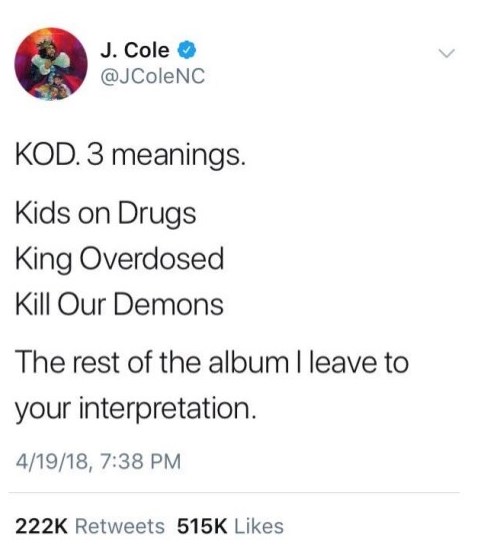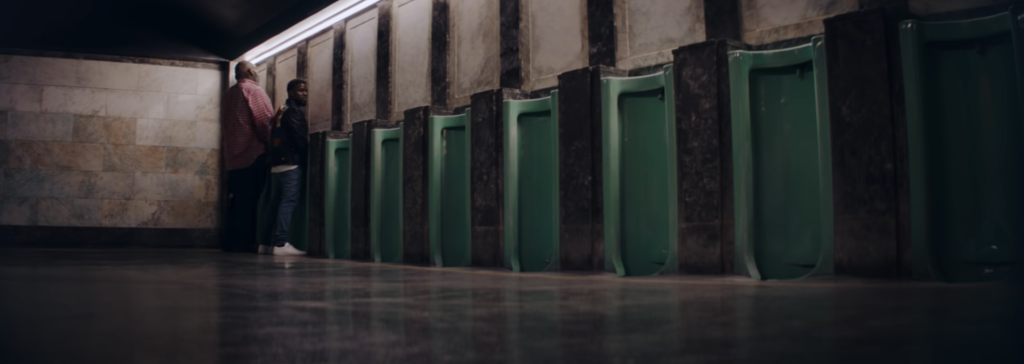How lyrical rapper J. Cole raises awareness about addiction and mental health
by Graham Lorenz
Is hip hop an occupational hazard? Two of my favorite rap artists, Mac Miller and Juice WRLD, recently died from overdosing on drugs. Since 2017, nine well-known rappers have died from either overdosing or gun-related violence. Many rap songs are about drugs, sex, violence, and confrontations with law enforcement—which can be deadly. Because sex and crime sell, rappers seem to not think or care about the impact their music has on their listeners. Lyrical rapper J. Cole is on a mission: he has taken on the role of changing rap’s image so that younger generations have better role models. His 2018 KOD album, following a drug-related death of 21-year-old rapper Lil Peep, discusses topics of addiction and calls rappers to spread more positive messages in their songs. Before the release, Cole tweeted that the album name KOD has 3 meanings: Kids on Drugs, King Overdosed, and Kill Our Demons.

These three overarching themes are conveyed with J. Cole’s iconic rap style— smooth lyrical rapping over hip hop beats with R&B choruses. The album instantly made history, as J. Cole became the first musician to have three songs debut simultaneously in the top 10 on the Billboard Hot 100 (“ATM,” “Kevin’s Heart,” and “KOD”). Today, its legacy has been cemented as it is certified Platinum, meaning that over 1 million album units have been sold. J. Cole’s message may not be falling on deaf ears because he’s struck a new note with audiences, a softer tone, lyrical, reflective, and even melancholic. The music videos that accompanied the release of the album show some of these aspects of his music. Let’s look at a couple examples.
“Kevin’s Heart” was one of the three songs to debut in the top 10 of the Billboard Hot 100. The song is titled after famous comedian Kevin Hart, who had recently admitted to cheating on his pregnant wife. The music video was released alongside the album in April of 2018. It follows Hart through a seemingly normal day, but the lyrics from the song make it clear that, beneath the surface, he is really struggling with addiction. Scott Lazer, the director of the video, told Genius that J. Cole wanted everywhere Kevin goes (in the video) to experience one of two reactions: “temptation or scorn.” “Kevin’s Heart” falls more into the Kill-Our-Demons meaning of the KOD album. Cole had stated that the song’s deeper purpose was “To face our shit and realize we have some shit going on inside – everybody.” Everybody knows the famous saying, “no one is perfect.” Cole looks to convey this message by using a famous celebrity, Kevin Hart, who was maybe thought to be “untouchable” before his scandal.
The video opens with an exterior profile shot of Hart driving his car, with a depressed solo instrument accompanying the lyrics, most notably:
“Told myself I’m strong enough to shake it and I’m trying
But I’m only human, I know loving you’s a crime”
The melancholic intro is soon overtaken by a full hip hop beat with Cole singing the song’s chorus (which mentions drug addiction) :
“Slip me a xanny at once (Somebody)
I got the earth in a blunt (Smoke)”
The continuation of the depressed instrument, juxtaposed to the upbeat hip hop music, represents the lingering effects of addiction and sadness associated with it. The climax of the music video happens at 3:10. Hart is eating dinner at a restaurant when a lady at the bar slips him a note inviting him over. The music stops. Kevin then goes to the restroom, where a comedic scene happens between him and a random guy who chooses the urinal right next to his.

Hart, annoyed with this guy, goes to wash his hands, but the stranger stops him, saying “Hey man look, nobody’s perfect, and you’re only human… just learn from it man.” The scene changes to Kevin walking up the steps of his house, with the depressed instrument playing unaccompanied behind the final lyrics of the song:
“They tell me what’s done in the dark will find a way to shine
I done did so much that when you see you might go blind”

Hart lets out a slight laugh before entering his home, perhaps laughing about how foolish it would have been to throw away his marriage by getting with the girl at the bar. In reality, we know that Hart didn’t make this choice and ended up cheating on his wife. The final scene of the video is a shot that pans up to the sky, where clouds are formed as the words “choose wisely.” J. Cole’s final note is reflective of a central message of the KOD album: think before you act.
The music video for the song “ATM” currently has 79 million views on YouTube. The song calls out how modern-day rappers are blinded by money and the consequences their greed has. An example being 50 Cent, who would constantly flaunt his wealth from his rap, but in 2015 was forced to file bankruptcy due to ill advised purchases. The video opens with a scene of Cole flying in the air on a throne, holding a dollar bill on a string behind him, as kids– flying on prescription drug containers– follow him through the air.

“Count it up, count it up, count it up, count it ” (x6)
The message is clear: many kids want to be like the rappers they listen to because of the money they get, but fail to see the harmful drug addictions that can often accompany fame. The song’s repetitive chorus then comes in:
The repetitiveness of the chorus deals with the overwhelming addiction rappers have to money, continually counting it as if wealth is the only thing that matters. After the chorus, Cole exhibits his lyrical genius through a fast-paced verse where he satirically raps, as though he is one of these greedy rappers. Along with the lyrics, the video shows a recurring shot of Cole in a straitjacket, in a room where the walls are covered with money. Cole raps:
“don’t give a f*** if it kills, it mix well
I’m only counting Big Bills Big Bills”
As I mentioned, I lost two of my favorite artists to drug overdoses. Cole is calling out the ridiculousness associated with some of their logic, commenting on how rappers mix drugs that are known for being fatal and completely ignoring the dire consequences. Like his “Kevin’s Heart” music video, Cole saves the best, or most meaningful, spectacle for last. The final scene shows Cole driving a convertible into the sky to chase a dollar bill on a string, however, he fails to reach it and the car falls out of the sky, crashing into the ground.
Since 2000, 77% of mainstream rap songs mention the use of prescription drugs. Additionally, there has been an increasing rate of rappers overdosing on prescription drugs. J. Cole has seen enough of his friends in the industry die. He has waged a war against negative influences in rap songs, and his KOD album won him a glorious battle.